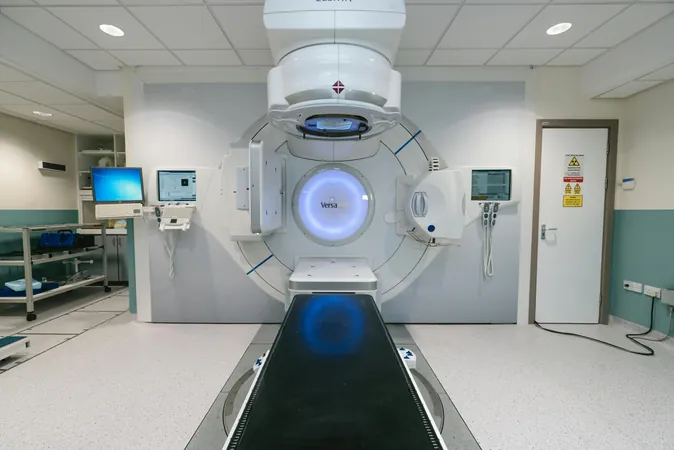
Exciting Breakthrough: Personalized Radiotherapy Offers New Hope for Bladder Cancer Patients!
2024-10-07
Author: Siti
Introduction
Researchers are on the brink of a groundbreaking transformation in the treatment of muscle-invasive bladder cancer through the introduction of personalized radiotherapy. A dedicated team from The Institute of Cancer Research, London, has demonstrated that customizing radiotherapy specifically to target the areas affected by cancer could lead to safer, more effective treatment outcomes with fewer long-term side effects.
Published Findings
Their findings are published in the reputable journal *European Urology*, shedding light on the promising potential of personalized care in oncology. Professor Robert Huddart, an authority in urological cancer and an Honorary Consultant Clinical Oncologist at the Royal Marsden, highlights the complexities involved in delivering targeted radiotherapy for bladder cancer. He expressed enthusiasm over the study's results, stating, "Our work allows for the administration of a higher dose while ensuring patient safety, which may ultimately lead to more cures."
Current Treatment Limitations
Current treatment methodologies typically adopt a "one size fits all" approach, whereby each patient receives the same dosage during a treatment cycle. This can be particularly limiting given the dynamic nature of bladder cancer, where the organ's shape and position can shift, complicating the administration of precise radiotherapy. With over 130,000 patients undergoing radiotherapy in the NHS annually, there's an urgent need for innovative solutions to enhance treatment effectiveness.
Adaptive Radiotherapy Method
The adaptive radiotherapy method, which is at the core of this latest research, allows healthcare professionals to adjust the radiation delivery based on each patient's unique anatomy at each session. The Phase 2 RAIDER study, which took place across the UK, Australia, and New Zealand, involved 345 participants divided into three groups. One group received the conventional, standardized treatment, while the other groups had their therapy customized in real-time during each appointment, with one even receiving a boosted radiation dose.
Study Results
Participants were monitored for side effects and overall quality of life post-treatment, and the results revealed fewer instances of severe long-term side effects compared to previous studies. Notably, those who received higher radiation doses did not report worse side effects—a promising indication that patients could tolerate intensified treatments with improved outcomes.
Expert Commentary
Professor Emma Hall, a leading figure in the study, remarked on the progress in radiotherapy technology, which allows for more tailored treatment approaches in oncology. She expressed gratitude to the trial participants whose involvement is crucial for validating the effectiveness and safety of adaptive radiotherapy in bladder cancer.
Future Research Needs
While the trial itself was not designed to conclusively establish this methodology's effectiveness against cancer, further research is on the horizon to evaluate these promising results more rigorously. Dr. Hattie Brooks from Cancer Research UK also emphasized the significance of adaptive radiotherapy, adding, "This targeted approach could pave the way for patients to experience fewer side effects while navigating their cancer treatment journey."
Conclusion
As medical science continues to evolve, the RAIDER study stands as a beacon of hope, accelerating the adoption of personalized, less invasive treatments aimed at improving the quality of life for those battling bladder cancer. Stay tuned for further updates on this revolutionary approach that could redefine cancer treatment as we know it!



 Brasil (PT)
Brasil (PT)
 Canada (EN)
Canada (EN)
 Chile (ES)
Chile (ES)
 España (ES)
España (ES)
 France (FR)
France (FR)
 Hong Kong (EN)
Hong Kong (EN)
 Italia (IT)
Italia (IT)
 日本 (JA)
日本 (JA)
 Magyarország (HU)
Magyarország (HU)
 Norge (NO)
Norge (NO)
 Polska (PL)
Polska (PL)
 Schweiz (DE)
Schweiz (DE)
 Singapore (EN)
Singapore (EN)
 Sverige (SV)
Sverige (SV)
 Suomi (FI)
Suomi (FI)
 Türkiye (TR)
Türkiye (TR)